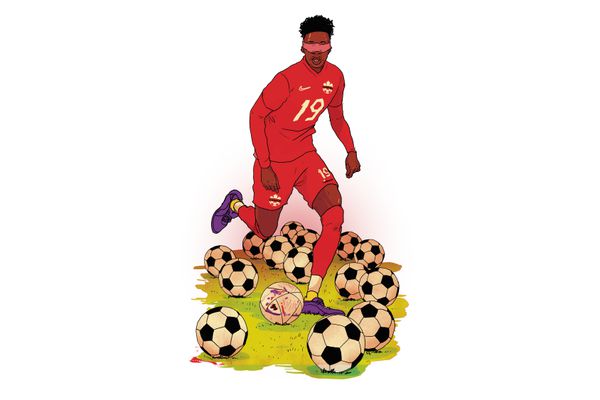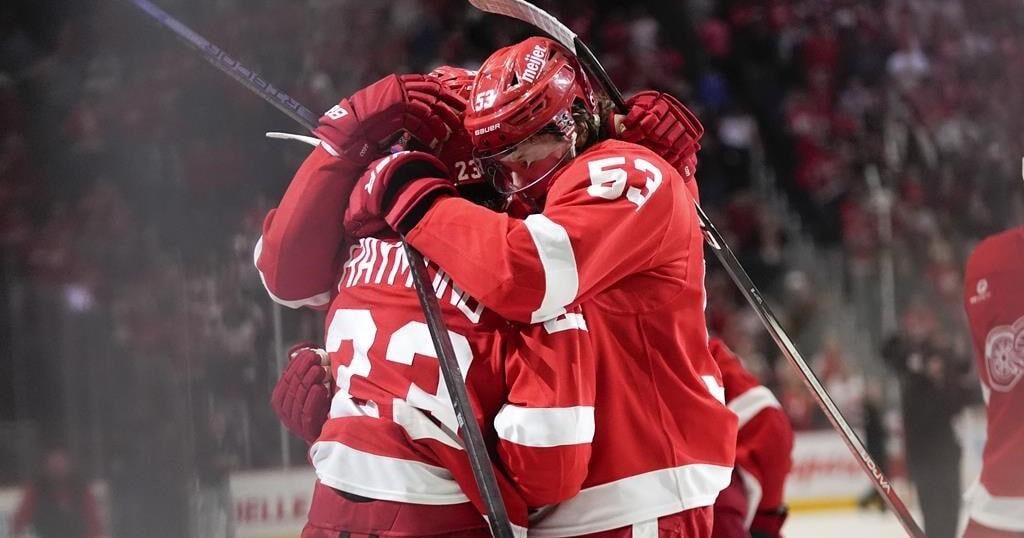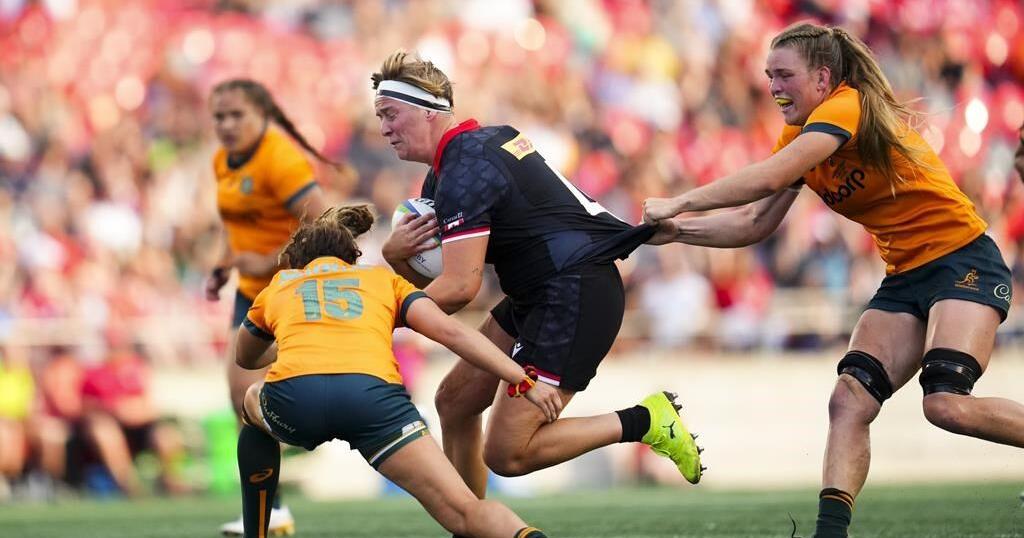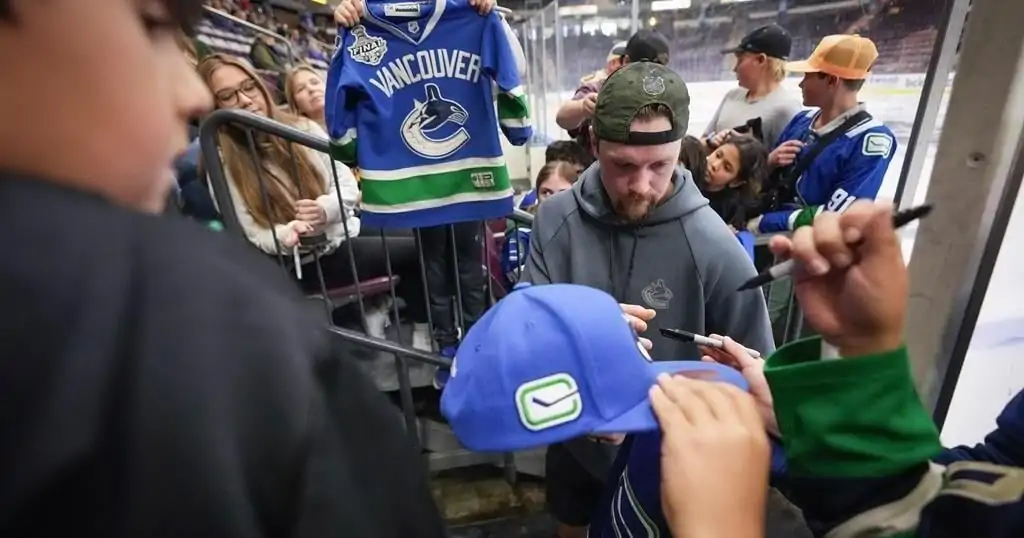Veterans Tyson Beukeboom and Karen Paquin will lead Canada at the WXV 1 women’s rugby tournament starting later this month in the Vancouver area.
WXV 1 includes the top three teams from the Women’s Six Nations (England, France and Ireland) and the top three teams from the Pacific Four Series (Canada, New Zealand, and the United States).
Third-ranked Canada faces No. 4 France, No. 7 Ireland and No. 1 England in the elite division of the three-tiered WXV tournament that runs Sept. 29 to Oct. 12 in Vancouver and Langley, B.C. No. 2 New Zealand and the eighth-ranked U.S. make up the six-team WVX 1 field.
“Our preparation time was short but efficient. This will be a strong team,” Canada coach Kevin Rouet said in a statement. “All the players have worked very hard for the last couple of weeks to prepare for WXV and we are excited for these next three matches and for the chance to play on home soil here in Vancouver against the best rugby teams in the world.
“France, Ireland and England will each challenge us in different ways but it’s another opportunity to test ourselves and another step in our journey to the Rugby World Cup next year.”
Beukeboom serves as captain in the injury absence of Sophie de Goede. The 33-year-old from Uxbridge, Ont., earned her Canadian-record 68th international cap in Canada’s first-ever victory over New Zealand in May at the Pacific Four Series.
Twenty three of the 30 Canadian players selected for WXV 1 were part of that Pacific Four Series squad.
Rouet’s roster includes the uncapped Asia Hogan-Rochester, Caroline Crossley and Rori Wood.
Hogan-Rochester and Crossley were part of the Canadian team that won rugby sevens silver at the Paris Olympics, along with WXV teammates Fancy Bermudez, Olivia Apps, Alysha Corrigan and Taylor Perry. Wood is a veteran of five seasons at UBC.
The 37-year-old Paquin, who has 38 caps for Canada including the 2014 Rugby World Cup, returns to the team for the first time since the 2021 World Cup.
Canada opens the tournament Sept. 29 against France at B.C. Place Stadium in Vancouver before facing Ireland on Oct. 5 at Willoughby Stadium at Langley Events Centre, and England on Oct. 12 at B.C. Place.
The second-tier WXV 2 and third-tier WXV 3 are slated to run Sept. 27 to Oct. 12, in South Africa and Dubai, respectively.
WXV 2 features Australia, Italy, Japan, Scotland, South Africa and Wales while WXV 3 is made up of Fiji, Hong Kong, Madagascar, the Netherlands, Samoa and Spain.
The tournament has 2025 World Cup qualification implications, although Canada, New Zealand and France, like host England, had already qualified by reaching the semifinals of the last tournament.
Ireland, South Africa, the U.S., Japan, Fiji and Brazil have also booked their ticket, with the final six berths going to the highest-finishing WXV teams who have not yet qualified through regional tournaments.
Canada’s Women’s Rugby Team WXV 1 Squad
Forwards
Alexandria Ellis, Ottawa, Stade Français Paris (France); Brittany Kassil, Guelph, Ont., Guelph Goats; Caroline Crossley, Victoria, Castaway Wanderers; Courtney Holtkamp, Rimbey, Alta., Red Deer Titans Rugby; DaLeaka Menin, Vulcan, Alta., Exeter Chiefs (England); Emily Tuttosi, Souris, Man., Exeter Chiefs (England); Fabiola Forteza, Quebec City, Stade Bordelais (France); Gabrielle Senft, Regina, Saracens (England); Gillian Boag, Calgary, Gloucester-Hartpury (England); Julia Omokhuale, Calgary, Leicester Tigers (England); Karen Paquin, Quebec City, Club de rugby de Quebec; Laetitia Royer, Loretteville, Que., ASM Romagnat (France); McKinley Hunt, King City, Ont., Saracens (England); Pamphinette Buisa, Gatineau, Que., Ottawa Irish; Rori Wood, Sooke, B.C., College Rifles RFC; Sara Cline, Edmonton, Leprechaun Tigers; Tyson Beukeboom, Uxbridge, Ont., Ealing Trailfinders (England);
Backs
Alexandra Tessier, Sainte-Clotilde-de-Horton, Que., Exeter Chiefs (England); Alysha Corrigan, Charlottetown, P.E.I., CRFC; Asia Hogan-Rochester, Toronto, Toronto Nomads; Claire Gallagher, Caledon, Ont., Leicester Tigers (England); Fancy Bermudez, Edmonton, Saracens (England); Julia Schell, Uxbridge, Ont., Ealing Trailfinders (England); Justine Pelletier, Rivière-du-Loup, Que, Stade Bordelais (France); Mahalia Robinson, Fulford, Que., Town of Mount Royal RFC; Olivia Apps, Lindsay, Ont., Lindsay RFC; Paige Farries, Red Deer, Alta., Saracens (England); Sara Kaljuvee, Ajax, Ont., Westshore RFC; Shoshanah Seumanutafa, White Rock, B.C., Counties Manukau (New Zealand); Taylor Perry, Oakville, Ont., Exeter Chiefs (England).
—
Follow @NeilMDavidson on X platform, formerly known as Twitter
This report by The Canadian Press was first published Sept. 18, 2024.





















